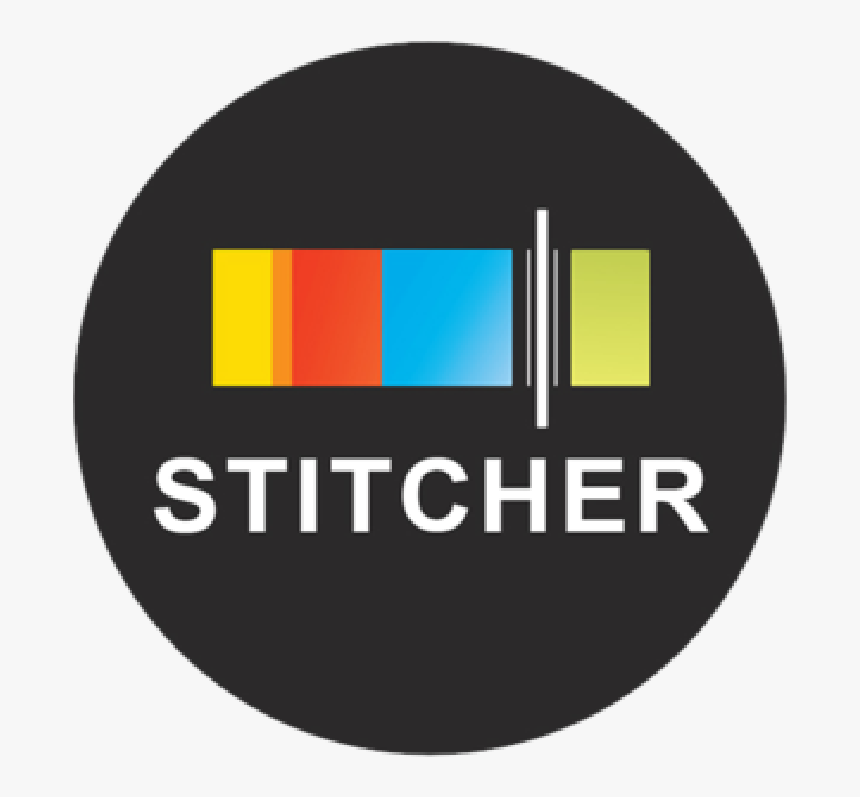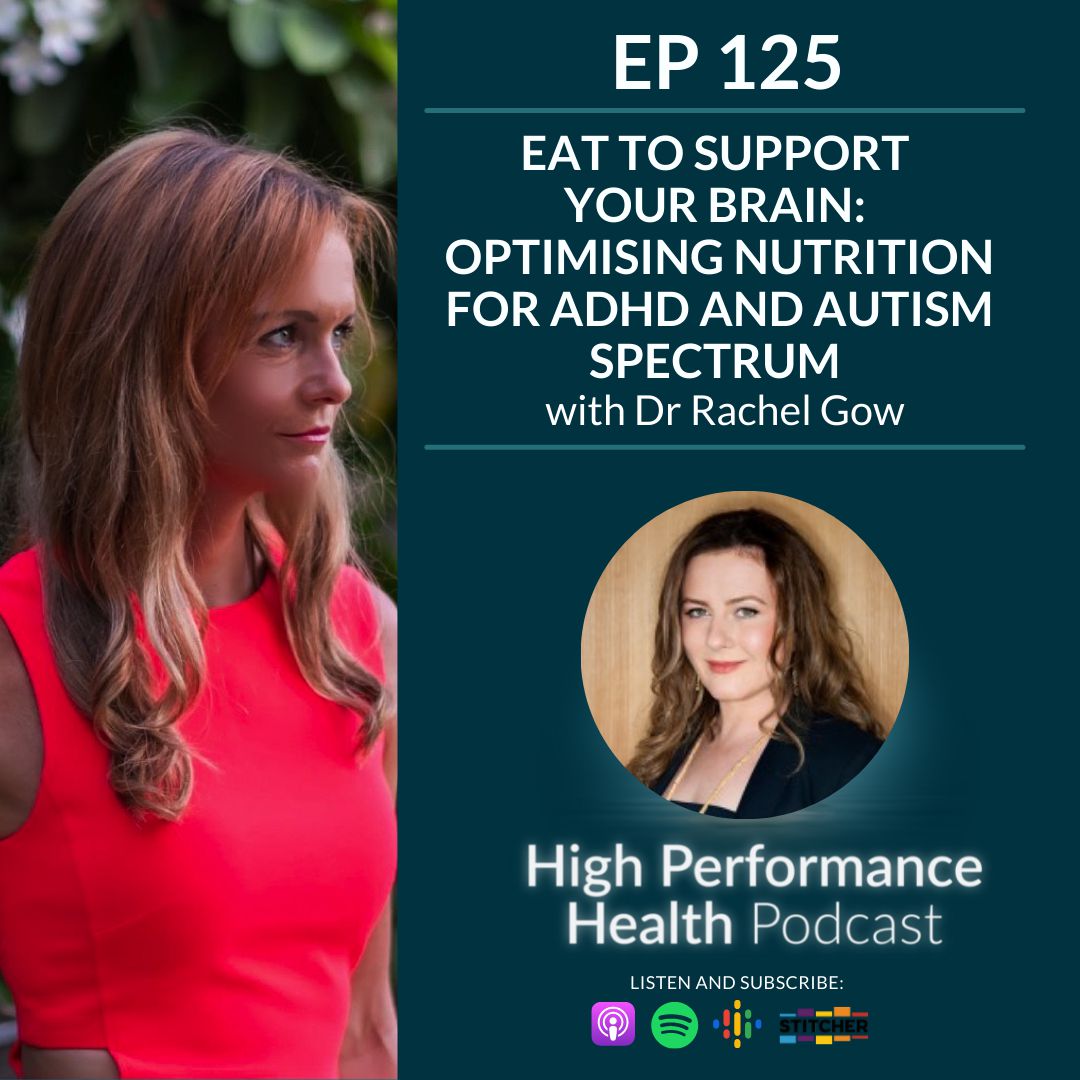
Angela Foster Performance Podcasts - Episode 125
EP 125 – Eat to Support Your Brain: Optimising Nutrition for ADHD and Autism Spectrum with Dr Rachel Gow
Dr Rachel Gow, is a Nutritional Neuroscientist, Neuropsychologist and
Neurodevelopmental specialist who focuses on ADHD and Nutritional Neuroscience
Her book “Smart Foods for ADHD and Brain Health” explains the vital role nutrition plays in influencing cognitive function, behaviour and mood and in this episode, she discusses with Angela how you can effectively eat to support good brain health.
She explains how cognitive function is impacted when there is a deficit of the brain selective nutrients that underpin the function of the brain and shares great practical advice on how to achieve optimum nutrition for great brain health
Listen to podcast the way you want
01
Listen with Transcript
02
Listen without Transcript
03
Watch on Youtube
Eat to Support Your Brain: Optimising Nutrition for ADHD and Autism Spectrum with Dr Rachel Gow
Dr Rachel Gow, is a Nutritional Neuroscientist, Neuropsychologist and
Neurodevelopmental specialist who focuses on ADHD and Nutritional Neuroscience
Her book “Smart Foods for ADHD and Brain Health” explains the vital role nutrition plays in influencing cognitive function, behaviour and mood and in this episode, she discusses with Angela how you can effectively eat to support good brain health.
She explains how cognitive function is impacted when there is a deficit of the brain selective nutrients that underpin the function of the brain and shares great practical advice on how to achieve optimum nutrition for great brain health
Key Takeaways
The fundamental role of nutrition is often overlooked but what you eat ultimately affects your brain structure and function at both molecular and cellular levels
65% of the dry weight of the adult brain and retina is made up of complex specialised and unique fats called lipids
It’s estimated we have around a hundred billion neurones each coated in a myeline sheet made up of DHA insulating and aiding neurotransmission
A child with optimal DHA can break down a question, understand and compute an answer
A child with sub-optimal DHA will still be trying to figure out what the question is
We need DHA and EPA for brain function in self signalling and for the regulation of specific systems such as serotonin and dopamine
Serotonin governs feelings of well-being and happiness, dopamine is critical in motivation and feelings of pleasure and reward
Adequate Omega 3 supports both dopamine and serotonin systems functioning well
When dopamine is low individuals self-medicate to try and normalise the level by adding other things
The quality of the maternal diet is critical for the well-being of the mother and the development of the baby’s brain
It’s hypothesised that babies born prematurely miss out on the biomagnification process of fatty acids and lipids in the last trimester
There is a bi-directional relationship between the brain and the gut so the health of the gut is critical
We have to move beyond the prescription pad, combining strands of science to create a personalised, integrative approach
Best Moments
‘Your brain is an organ like the heart and there are specific nutrients required to fuel the brain and to keep it working optimally’
‘Gut health is critical for brain health’
‘A multidisciplinary approach combining strands of science provides an amazing insight into the complex relationships within the body’
Contact Details
About the Host
Angela Foster
Angela is a Nutritionist, Health and Performance Coach. She is also the Founder and CEO of My DNA Edge, an Exclusive Private Membership Site giving individuals the tools and bio hacks needed to optimise their genetic expression for optimal health and performance.
After recovering from a serious illness in 2014, Angela left the world of Corporate Law with a single mission in mind:
To inspire and educate others to live an energetic, healthful and limitless life.
Angela believes that we can truly have it all and has spent the last 5 years researching the habits and routines of high performers, uncovering age-old secrets, time-honoured holistic practices and modern science to create a blueprint for Optimal Human Performance.
About the Guest
Rachel V. Gow, Ph.D is a Nutritional Neuroscientist, Neuropsychologist and
Neurodevelopmental specialist with expertise in a range of mental health conditions and
associative learning and behaviour differences. In addition, Dr. Gow is a Registered Nutritionist (under the category of Science). In October 2019, following a period living and working in Los Angeles, California (as a Research and Development Manager), Dr. Gow partnered with Dr. Balu Pitchiah, GMC Registered Psychiatrist. Together they launched Nutritious Minds Consulting; a novel, nutrition and brain-health clinic providing a unique and comprehensive avenue to psychological health by adopting a personalised, science-based, integrative approach with interventions for the whole family. Nutritious Minds Consulting is based in London, W1.
Dr. Gow holds a Visiting Lecturer position at the University of Surrey, has held the
position of Associate Lecturer at London Metropolitan University and has an honorary role at The Institute of Psychiatry, King’s College London. Between 2012-2016, Dr. Gow was the Lead Associate Investigator of the Neuroimaging, Omega‐3 and Reward in Adults with ADHD
(NORAA) trial at the National Institutes of Health (NIH) in Bethesda, Maryland, U.S. This study was the first randomized, double‐blind, placebo‐controlled, clinical trial globally to test the effects of omega‐3 fats in the brain activity of adults with ADHD using neuroimaging
techniques. In 2012, Dr. Gow was awarded a Ph.D in Child Neuropsychology from the Institute of Psychiatry, King’s College London. Her Ph.D was conducted in the Department of Child and Adolescent Psychiatry and involved a clinical research project investigating blood measures of omega-3 fatty acids and assessments of brain function using EEG and Event Related Potentials in children/adolescents with and without ADHD. Dr. Gow has a Master of Science in Psychological Research Methods (Distinction) from Birkbeck University of London. Dr. Gow’s under-graduate Psychology degree was awarded First Class with Honors from the University of Kingston, London, accredited also by the British Psychological Society.
Collectively, Dr. Gow has approximately 18 years of research and experience in
psychological research in child/adolescent and adult clinical populations. Her research integrates multiple modalities including functional and structural magnetic resonance imaging, neuropsychological assessment, genetic sequencing and nutrition/biochemistry.
Dr Gow has published 22 peer reviewed book chapters and scientific papers, her first
book on Nutritional Neuroscience will be published in 2020. She has extensive knowledge in
neurodiverse learning and behavioural differences and the effects of dopamine enhancing brain‐selective nutrients. Dr. Gow has been an active member of the International Society for the Study of Fatty Acids and Lipids (ISSFAL) since 2008 and was awarded one of their New Investigator’s Awards in 2012. Dr Gow has worked with both television, radio and media and was named as a “Leading Lady” by Time & Leisure Magazine. Her newly published book – “Smart Foods for ADHD and Brain Health” – is available to order on Amazon (Jessica Kingsley Publishers part of the Hachette UK Group).
Dr. Gow is also the founder of a non-for-profit organization called Nutritious Minds
Trust. The aim of the trust is to advocate for all types of learning and behaviour differences and empower young people to reach their highest potential through psychological, educational, nutritional support and community projects focused on the Creative Arts and Music. Nutritious Minds organizes community events and workshops on Nutrition, Fitness and Mental-Health and provides a motivational platform for individuals to talk about their collective experiences living with diagnostic labels as well as sharing inspiration and the tools which enabled them to overcome tumultuous obstacles in their lives.
CONTACT DETAILS
Dr. Rachel V. Gow can be contacted at:
linkedin.com/pub/rachel-v-gow-phd/14/685/9b
Twitter: @drrachelvgow
f facebook.com/DrRachelVGow
Insta @nutritious_minds
Subscribe to receive the latest health tips
Get my latest health, fitness, biohacking, anti-aging tips, and podcast episodes delivered straight to your inbox.
Recent Podcasts
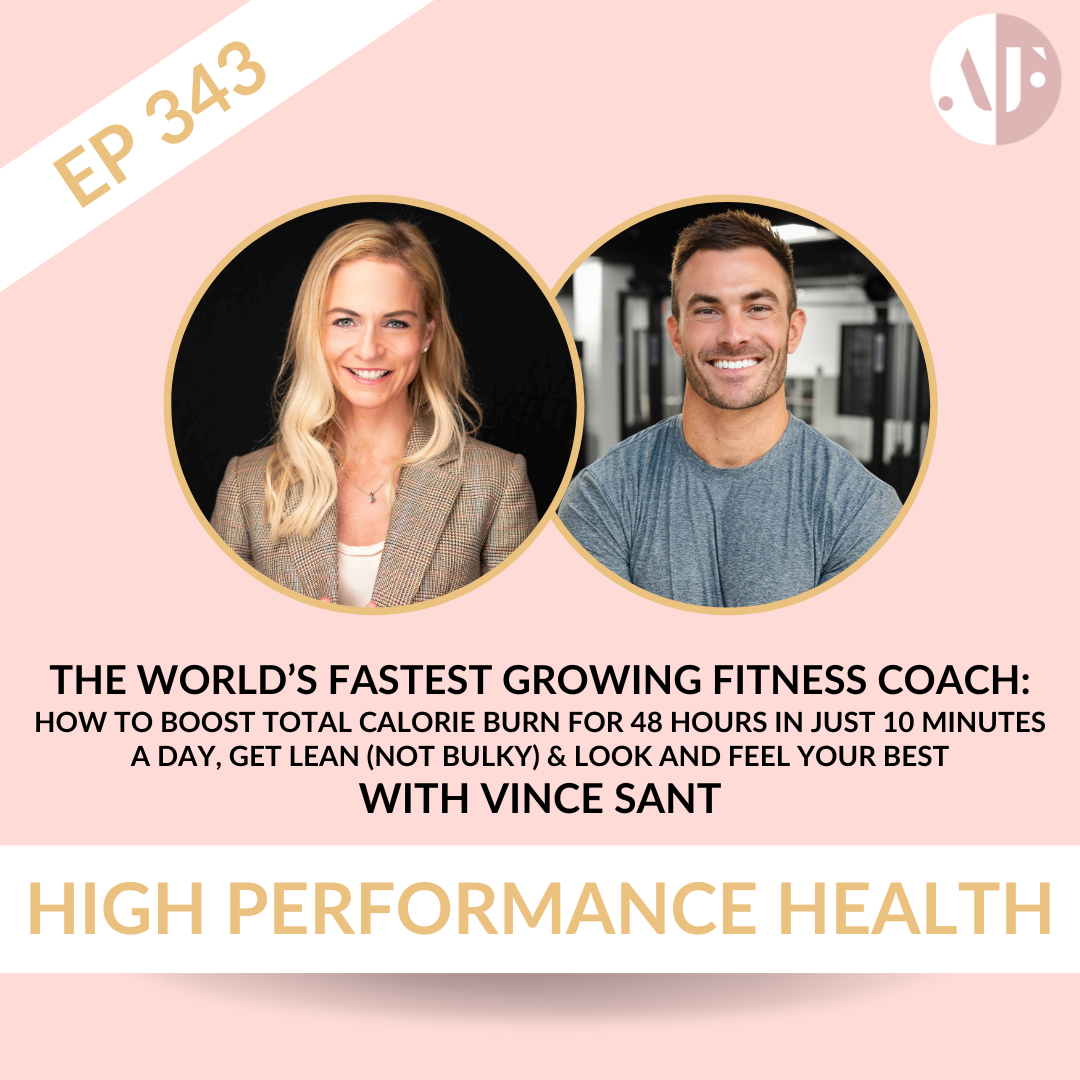
EP 343 – The World’s Fastest Growing Fitness Coach: How to Boost Total Calorie Burn for 48 Hours in Just 10 Minutes a Day, Get Lean (Not Bulky) & Look and Feel Your Best with Vince Sant
Angela presents a biohack alongside Dr Jacey Folkers, in which they discuss the importance of strategically dosing carbohydrates before a workout for optimal performance. They delve into the impact of insulin resistance on blood glucose control, and hormone balance, particularly in women, and how certain peptides and supplements can help improve insulin sensitivity and hormonal health.
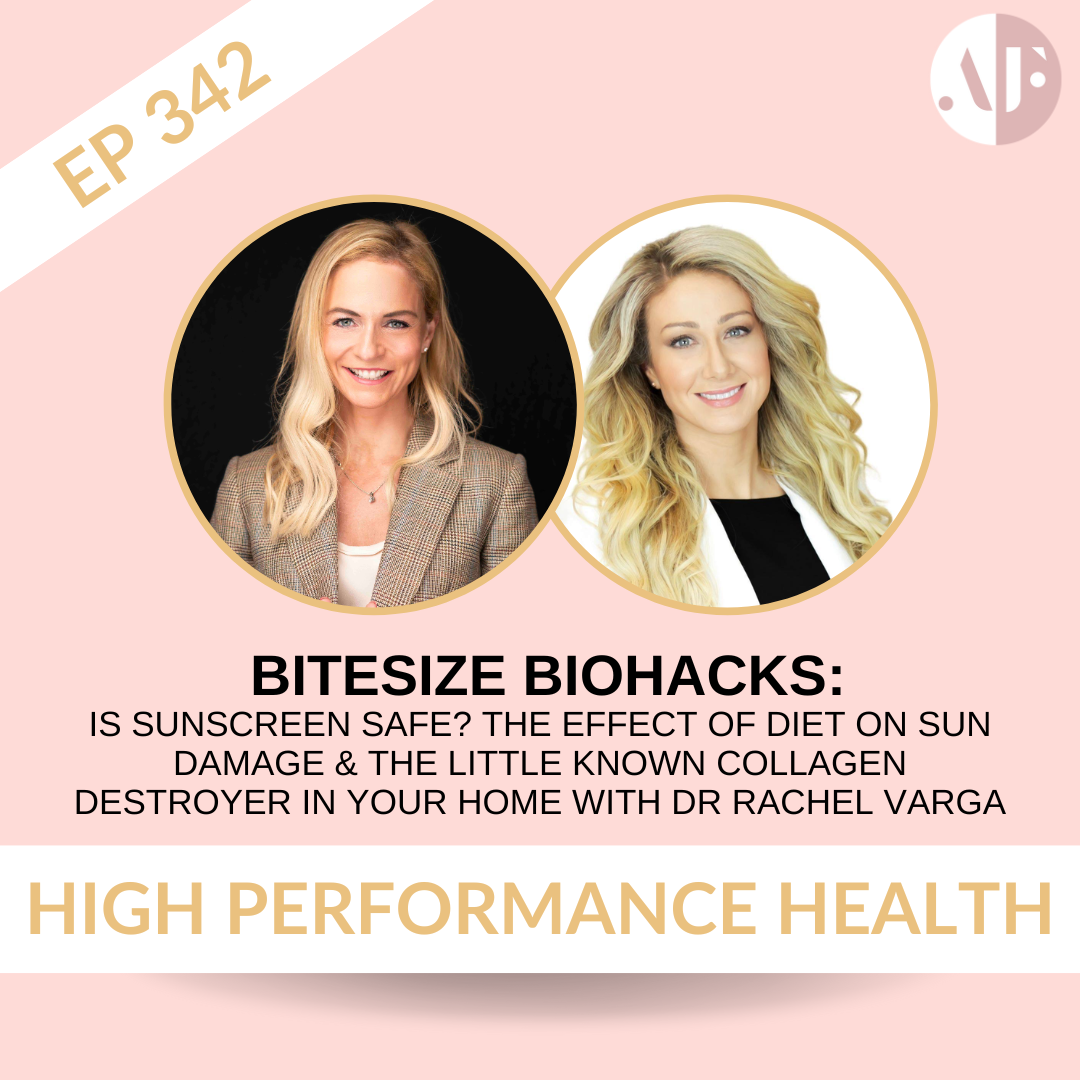
EP 342 – Bitesize Biohack: Is Sunscreen Safe? The Effect of Diet On Sun Damage & The Little Known Collagen Destroyer in Your Home with Dr Rachel Varga
Angela presents a biohack alongside Dr Jacey Folkers, in which they discuss the importance of strategically dosing carbohydrates before a workout for optimal performance. They delve into the impact of insulin resistance on blood glucose control, and hormone balance, particularly in women, and how certain peptides and supplements can help improve insulin sensitivity and hormonal health.
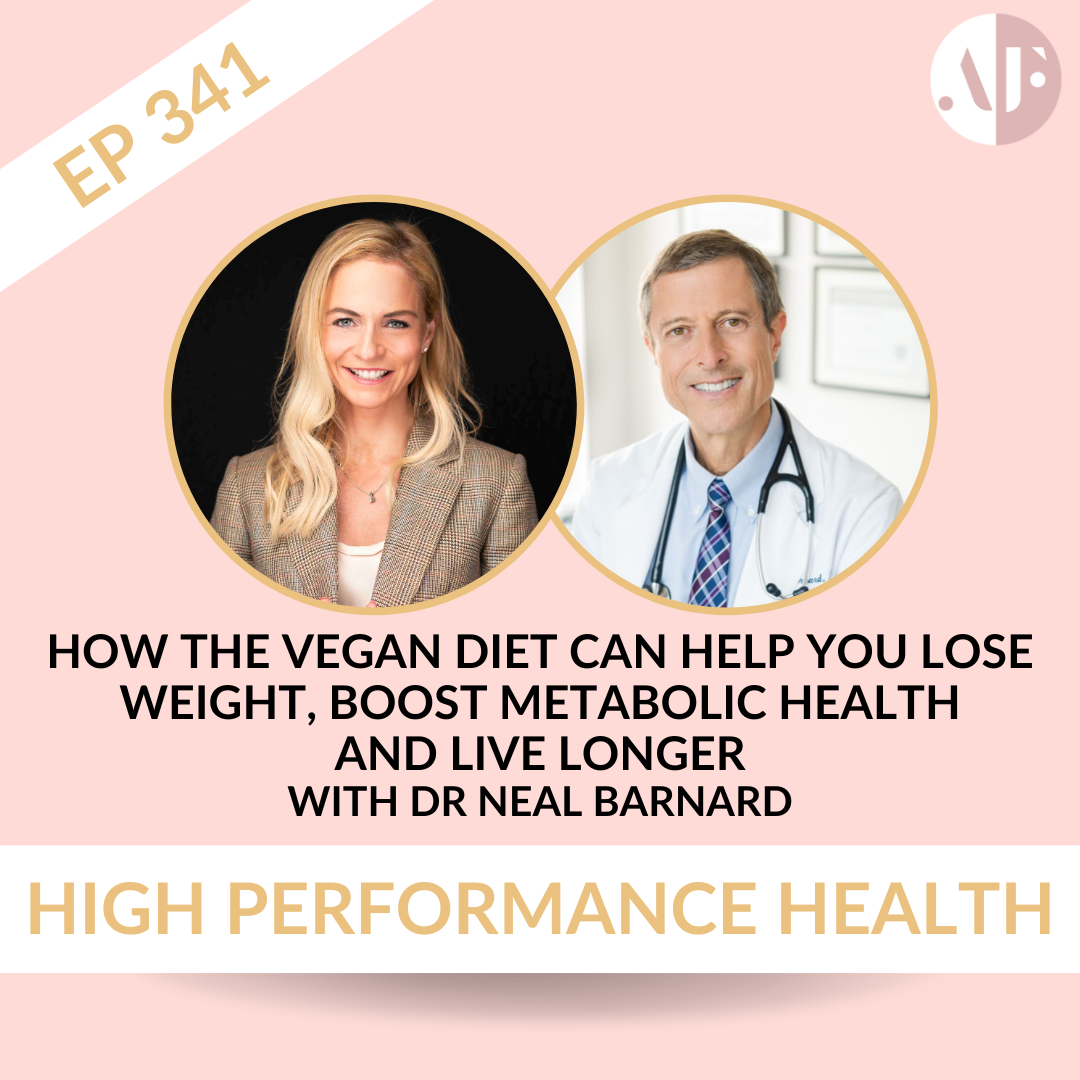
EP 341 – How the Vegan Diet Can Help You Lose Weight, Boost Metabolic Health and Live Longer with Dr Neal Barnard
Angela presents a biohack alongside Dr Jacey Folkers, in which they discuss the importance of strategically dosing carbohydrates before a workout for optimal performance. They delve into the impact of insulin resistance on blood glucose control, and hormone balance, particularly in women, and how certain peptides and supplements can help improve insulin sensitivity and hormonal health.
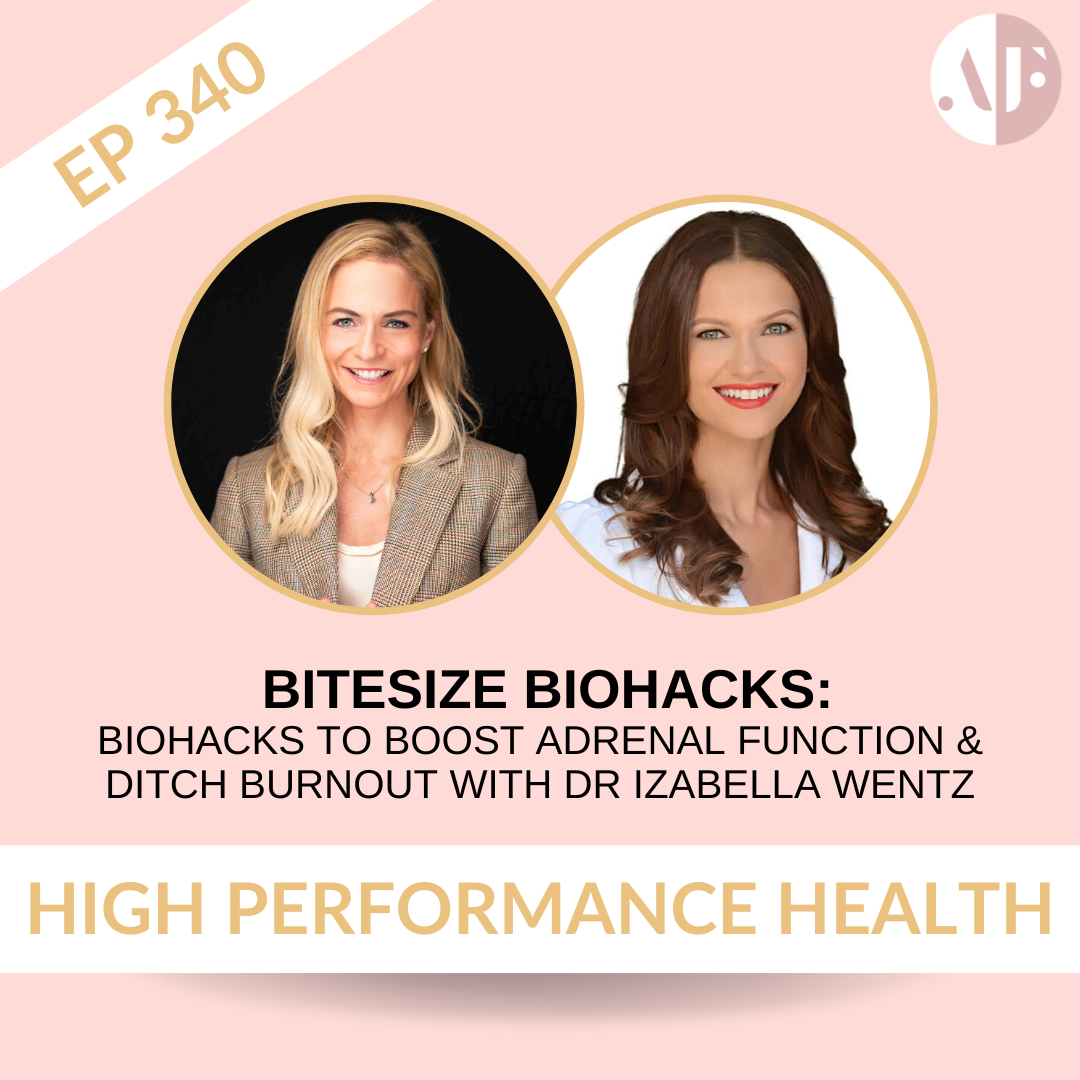
EP 340 – Bitesize Biohacks: Biohacks to Boost Adrenal Function & Ditch Burnout with Dr Izabella Wentz
Angela presents a biohack alongside Dr Jacey Folkers, in which they discuss the importance of strategically dosing carbohydrates before a workout for optimal performance. They delve into the impact of insulin resistance on blood glucose control, and hormone balance, particularly in women, and how certain peptides and supplements can help improve insulin sensitivity and hormonal health.



